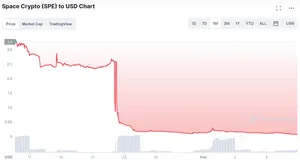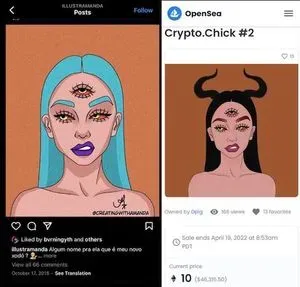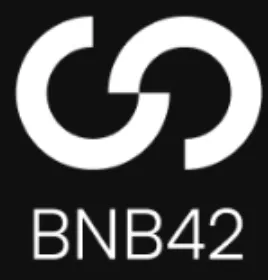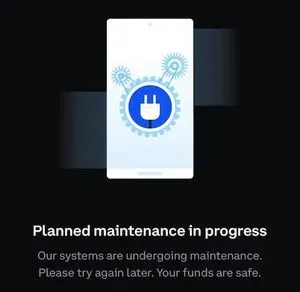Nelson Mandela's paintings from prison to be sold as NFTs
The Associated Press wants to sell you an NFT of migrants adrift at sea
However, on February 24 they announced that their newest NFT would show a short, top-down video of around fifty migrants crammed into a small inflatable boat, adrift at sea in the Mediterranean. Any goodwill the AP might have had for their NFT project was likely shattered by their choice to monetize a video of human suffering. The already horrific NFT announcement was particularly ill-timed, given its juxtaposition on many Twitter feeds amongst news of Russian military action against Ukraine. The Associated Press deleted the announcement tweet four hours later.
Founders of BitMEX crypto exchange take guilty plea, pay $10M fine for failing to implement an anti-money laundering program
In March, the third co-founder, Sam Reed, also pled guilty and agreed to pay a $10 million fine. In August, top BitMex employee Gregory Dwyer entered a guilty plea and agreed to pay a $150,000 fine.
BitMEX had attempted to evade sanctions by claiming they didn't serve customers in the United States, though in reality they served thousands of U.S. customers and marketed in the U.S. At one point, when an early investor inquired as to why an investment in the company hadn't triggered a report to regulatory authorities, Delo responded with a meme of a man smiling, superimposed with the text "Incorporated in Seychelles, come at me bro". Hayes and Delo face a maximum sentence of five years in prison as a result of this plea. The exchange had in August paid $100 million to settle a separate lawsuit from the Commodity Futures Trading Commission, in an agreement which had also required them to implement proper blocks to prevent U.S. customers from using the service.
- "Founders Of Cryptocurrency Exchange Plead Guilty To Bank Secrecy Act Violations", The U.S. Attorney’s Office, Southern District of New York
- "BitMEX to Pay $100 Million to Resolve Regulator’s Lawsuit Over Crypto Derivatives Trading", The Wall Street Journal
- "Third BitMEX Founder Pleads Guilty to Anti-Money-Laundering Violation", The Wall Street Journal
- "Top BitMEX Employee Pleads Guilty to U.S. Charge", The Wall Street Journal
Space Crypto game surprises its player base with new, disadvantageous tokenomics
- Space Crypto (SPE) to USD Chart, CoinMarketCap
- Tweet by mikacrypto__
Utility promising to restore mining performance on Nvidia GPUs actually malware
NBA player De'Aaron Fox ditches his NFT project after raking in $1.5 million
Suddenly, on February 23, the project deleted its social media accounts and most of its Discord. Fox wrote in the remaining Discord announcements channel that "The time and attention that y'all deserve and that I wanted to give you all/what this project requires, was not known to me and I overstepped and stretched myself too thin, trying to do this project in the middle of an NBA season." He promised to send anyone who bought more than five NFTs (which would have cost ~0.4 ETH, around $1,300, if bought at mint price) a signed jersey (available for purchase online for around $100).
The following day, after some attention was drawn to the rug pull, Fox released a Twitter statement that said basically nothing at all, and made no mention of reimbursing holders. Meanwhile, the floor price of the NFTs dropped to around 0.003 ETH ($8).
Seller withdraws Sotheby's CryptoPunks auction minutes before it's due to go live, likely due to "tepid" reception
However, 0x650d withdrew the sale only minutes before the auction was due to start, tweeting only "nvm, decided to hodl". CoinDesk reported that, "Perhaps contributing to 0x650d's reversal were rumors of a tepid reception for the CryptoPunks mega-lot. Three sources, including one bidder on-site at Sotheby's, told CoinDesk that the highest pre-bid offer was $14 million, which was also the reserve price."
Journalist says she's been able to use chain analysis tools to discover the person behind the 2016 hack of The DAO
Journalist and researcher Laura Shin reported on February 22 that she had successfully used a forensics tool from Chainalysis to discover the identity of the hacker: Toby Hoenisch, a co-founder of the TenX "crypto debit card" project. Hoenisch refused to speak with Shin, and has denied the allegation.
For a technology that makes lofty promises of anonymity and privacy, increasingly-powerful technology is being released that at least claims to be able to unwind crypto mixing and make other connections between wallets and transactions that were previously extremely difficult, if not next to impossible. I imagine there may be a few people behind various crypto crimes sweating a bit as these technologies progress and threaten to unmask those behind other hacks and scams.
Security researchers desperately try to contact Ocean Protocol about a critical security problem
After Bleckmann-Dreher's attempts to contact the project were published on Web3 Is Going Great on February 26, Ocean Protocol's founder Bruce Pon commented to say they were "on it", and that he had alerted Data Whale about what appeared to be an issue in the ALGA project. Several hours later, Data Whale announced they would be taking the app offline due to concerns that there was a vulnerability, and that they had contacted the researchers. ALGA was later brought back online after they confirmed the vulnerability was not an issue with their project, but rather with Ocean Protocol itself. Pon acknowledged on February 27 that "there was a configuration issue on Ocean compute-to-data which is being fixed now", and later that day Ocean Protocol cut a new release of their operator engine which appeared to be a patch.
Coinbase CEO tries to weave a compelling story about how their own team came up with a Super Bowl ad that "broke the rules on marketing", is quickly revealed to just be taking credit for the work of an outside ad agency
Unfortunately for him, CEO of The Martin Agency Kristen Cavallo showed up with receipts: "It was actually inspired by presentations our agency showed your team on 8/18 (pages 19-24) and 10/7 (pages 11-18) with ad concepts for the Super Bowl with floating QR codes on a blank screen."
I guess if there is a lesson here it is that if you're going to take credit for someone else's idea to try to make your team sound good, maybe you shouldn't also use it as an opportunity to dunk on the people who actually came up with the idea.
Another pseudonymous defi project exec revealed to have a checkered past
On February 20, 0xbrainjar confirmed that he was indeed Zaki. He wrote, "I did this so that my efforts to build up a suite of products would not be shadowed by a mistake that I made in my past.... 0xbrainjar was a place for me to not be defined by this serious misstep (which has been settled and was amplified by the media)". He also wrote on Twitter that "I do not want a mistake in my youth to cloud all of the team's efforts", though the SEC charge was filed less than three years ago, when Zaki was 21.
Avalanche-based Atom Protocol rug pulls within a day of its launch, claiming a bug
Some users directed their anger at Assure DeFi, a project that claims to "privately verify the identity" of various projects. The group had reportedly verified the identities of those behind Atom Protocol, lending the project credibility to some who bought in. Assure later tweeted that "many people are still misunderstanding the role of KYC/verification. KYC is a deterrent and not a scam prevention and if anyone says otherwise they are misleading you."
Indian authorities arrest a group accused of $5 million cryptocurrency scam
Seventeen OpenSea users have their NFTs stolen and flipped for a total of $2.9 million by a phishing scammer
An hour and a half after users began to report missing NFTs, OpenSea finally acknowledged the issue. They tweeted that they were "actively investigating rumors of an exploit associated with OpenSea related smart contracts", and wrote that they believed it was a phishing attack coming from outside of OpenSea, rather than an issue with their contract. It was later determined that an attacker had successfully phished 17 OpenSea users into signing a malicious contract, which allowed the attacker to take the NFTs and then flip them. Bizarrely, the hacker returned some of the NFTs to their original owners, and one victim inexplicably received 50 ETH ($130,000) from the attacker as well as some of his stolen NFTs back. The attacker later transferred 1,115 ETH obtained from the attack to a cryptocurrency tumbler, worth around $2.9 million.
Former owner of a reportedly stolen Bored Ape files million-dollar lawsuit against OpenSea
- McKimmy v. OpenSea on CourtListener
- Etherscan records for the Bored Ape NFT
Crypto.Chicks team member gives a non-apology for blatantly copying the work of another artist
The following day, Crypto.Chicks announced that they would be replacing Polly as a team member, and pausing their planned release of another NFT collection that also appeared to contain stolen artwork.
Appeals court allows legal claim to continue against online promoters of Bitconnect
Authorities raid Generación Zoe, an Argentine pyramid scheme propped up by cryptocurrencies
- "Detuvieron al contador de Generación Zoe", Página 12 (in Spanish)
- "Pierri será el abogado de Leonardo Cositorto, CEO de Generación Zoe", Infobae (in Spanish)
- "Estafas: qué es Generación Zoe y quién es Leonardo Cositorto", Clarín (in Spanish)
- "A bitcoiner against a powerful cryptocurrency pyramid from Argentina", Money Training Club
Kickstarter says they "won't make changes to Kickstarter without you" after blockchain backlash... but they will continue with blockchain plans
Kickstarter's COO, Sean Leow, did an interview with The Beat to discuss the announcement. He seemed to be a little bit confused on the whole concept throughout, and seemed to believe that "open source" is some sort of competing idea to blockchains. At one point he stated, "We believe that that data can be structured in a way through a blockchain where it ... can move in a much more efficient and effective way between services ... in a way that open source doesn't allow". Later in the interview he spoke about governance, saying, "our understanding is that [governance] is done more effectively with blockchain then with open-source."
Someone blows up a Lamborghini to "criticize greed", then makes NFTs out of the pieces
SHL0MS then gathered 888 pieces of the wrecked car, took rotating videos of each one, and created NFTs from them. The NFTs were to be released on February 25 in an auction starting at 0.01 ETH (about $26), but the auction was delayed due to the news of Russia's military invasion of Ukraine.
It's likely SHL0MS will profit handsomely off the Lamborghini NFT. Their previous NFT collection, FNTN, involved similar rotating videos, in that case of an exploded toilet. The NFTs in that 185-piece collection have recently been trading at 1–2 ETH (several thousand dollars).
Andrew Yang announces plans to fight poverty with a lobbying group that distributes voting power in proportion to how much you pay
Interestingly, one of the people credited as a "contributing artist" to Lobby3 is "Robness", who had the previous day minted an NFT of a photo of a journalist as a child in an attempt to harass her.
Class action lawsuit names SafeMoon, its executives, Jake Paul, Nick Carter, and others in alleged pump-and-dump scheme
These influencers join a growing list of celebrities who have been named in class action suits over alleged pump-and-dumps. The list includes names like Kim Kardashian, who was named among others in a January class action suit pertaining to a coin called EthereumMAX.
- "Jake Paul, Nick Carter, Soulja Boy, Lil Yachty Facing ‘Pump and Dump’ Class Action Over SafeMoon Tokens", ClassAction.org
- "I UNCOVERED A BILLION DOLLAR FRAUD", CoffeeZilla's YouTube channel
Binance halts activities and marketing in Israel over "licensing issues"—namely, the lack of one
MetaDeckz ends trading card NFT project after facing legal action from streamers whose likenesses were used without consent
Following Ludwig's scathing statement and legal threat, MetaDeckz explained he was just "an artist who saw an oppertunity [sic]" and that he would disband the project. He later released a video explaining that he would stop the project, though his continued references to the cards as "the product" and his statements that he intended to continue working on the cards led some to question if he was just planning to try to monetize them in some other way. If that's the case, he may run into further issues given that the card illustrations all appear to be derived directly from photos of the streamers that don't belong to MetaDeckz.
NFT artist "Robness" mints an NFT of a journalist's childhood photo to harass her
Robness decided the best way to make his displeasure known would be to find a photo of Notopoulos as a young child and turn it into an NFT titled "VOTED MOST LIKELY TO BE A FAILED JOURNALIST: KATIE NOTOPOULOS". The NFT description read, "Failed journalism is a true art to master. With Buzzfeed's new article about the Bored Ape Yacht Club, Katie Notopoulos went where no journalist usually goes. She ousted [sic] both of the Bored Ape Yacht Club founders while providing baseless claims of racist tropes about their artwork to further stir up contention. We thank Katie for her continued pursuit in tainting the once respected practice of real journalism. Here we have what is known as doxx art. Enjoy."
The NFT platform where Robness originally listed the NFT, Known Origin, eventually took down the listing. However, due to the nature of blockchains, the NFT itself still exists and can continue to be accessed and traded despite one platform's intervention.
Even Gary Vee gets upset with the shady business in NFTs sometimes
Tabletop roleplaying game publisher Chaosium suspends their NFT project after backlash
BNB42 rug pulls for over $2.7 million
"NFT influencer" Morgan (@helloimmorgan) repeatedly fails to disclose being compensated for NFT promotions
Last year Morgan was caught up in scandal after it appeared she had bought a $24,000 Mutant Ape NFT while simultaneously running a GoFundMe trying to raise $20,000 for medical bills for her grandmother; she claims that the GoFundMe predated the MAYC purchase (though that seems to be in some doubt as well) and that all GFM funds went to her grandmother. Separately from that incident, she also created an NFT project called "Grumpkins" that was supposed to give 20% of profits towards children with cleft palates and also her grandmother's fund; after launching the project she quietly changed the donation amount to 10%.
Lonely Ape Dating Club launches to help Bored Ape NFT collectors find love, or maybe pay for it
The Lonely Ape Dating Club project announced their plans to build a dating app specifically for owners of Bored Ape NFTs — NFTs featuring illustrations of apes that trade for an average of around 90 ETH ($225,000). The app is not currently accepting signups from people who don't own a BAYC NFT, which raises more than a few questions about how successful a dating app will be when its pool of users seems to be overwhelmingly male, though perhaps I'm making too many assumptions about their sexualities. The app does promise plans to release a "Coin Digger" feature, which would "allow non-BAYC owners to connect with higher net worth individuals for mutual benefit", so perhaps that is their plan to solve that problem.
Sadly, the project was cancelled in May 2022 due to "unforeseen circumstances" which I have to imagine were pretty foreseeable.
Leaders of the Canadian truck protest come up with hilariously complex plan to distribute the Bitcoins they've collected
BuildFinance DAO project treasury drained after "hostile takeover"
The Belvedere Museum dreams big (or, rather, small) by splitting one single painting into 10,000 Valentine's Day NFTs
The website for the NFT sale explains a six-step process to obtain one of these NFTs, including the standard steps of connecting a wallet and joining the allowlist, but ending with "Dedicate your NFT to a beloved one", which involves sending... their loved one a form email, apparently. My heart goes out to anyone receiving an NFT for Valentine's Day, much less a $2,000 one representing a portion of a painting smaller than a postage stamp. To anyone who thinks this is a good idea: I am begging you, please just buy your partner some flowers.
One Monero mining pool creeps closer to that crucial 51% of the network hashrate
Jacked Ape Club NFT project team erupts in chaos
The following day, the project announced that control was back in the hands of Orange, Mitchell, Jango, and one other team member, and that the founders would be departing the project. The remaining team also announced that 105 ETH would be returned back to the project; they didn't address the 73 remaining ETH (around $220,000) that was reportedly taken by the founders.
Coinbase experiences an outage during the Super Bowl
This Super Bowl was the first to feature crypto advertisements. In addition to Coinbase's spot, Bud Light announced a beer-related NFT collection, Larry David appeared in an ad for the FTX exchange, and Crypto.com of course had a spot. What better time to make well-researched financial decisions than from your phone after a bunch of Super Bowl beers?
British tax collectors perform their first ever NFT seizure in tax evasion investigation
- "Taxman makes first ever seizure of NFTs", The Telegraph
Founder of an air taxi DAO writes of narrowly avoiding an elaborate scam attempt
While many web3 scammers are fairly primitive in their tactics, these appeared to be running a sophisticated and highly-targeted scam. The pair worked to impersonate an existing web3 project, even buying a similar domain. They apparently hired a 3D artist to produce renderings to help ingratiate one of the scammers into the target's web3 project. And when thomasg.eth inspected the scammers' addresses, he found that they were working with at least 100 ETH in funding (currently equivalent to around $300,000). thomasg.eth is currently holding over $100 million in his wallet with the same name, so it's not hard to see why the scammers might have picked him as a target worth some extra effort.
Crowdfunded TitanReach MMO game project crashes and burns after developer spends investor money on a bad crypto gamble and a Tesla
On February 11, Unravel announced that his studio "would be closing its doors for good. TitanReach will be laid to rest. The reasons for this are private." From there he went into a long message about the previously-unannounced crypto and NFT plans he had for the game, which unsurprisingly enraged the community who had supported the game.
YouTuber KiraTV, who had become close to the project, its developer, and the investor, revealed that the anonymous angel investor had been the cryptocurrency entrepreneur behind Yearn Finance, though Kira said that he believed the investor had not influenced Unravel to add crypto elements to the game. Kira alleged that Unravel had taken $150,000 of money sent by the investor and put it into $TIME, the token associated with the ill-fated Wonderland project. When he lost the money overnight, the investor cut funding for the project. It later came out that Unravel had allegedly used company money to make risky cryptocurrency investments besides the one incident with $150,000, and had even used the investor's money to purchase himself a new Tesla.
Porn actress Lana Rhoades apparently abandons her NFT project after its launch
However, only weeks after launch, Rhoades appeared to have abandoned the project, and most of the funds had been transferred out. Rhoades deleted her TikTok videos in which she had promoted it, and didn't respond to tweets asking about the project. One community member wrote on Discord that they had "spent what [they] can't lose. Spent 4k, on total I had 6k. Man I'm left with 2k only. No job and have a 2 yo son". Hopefully the guy who got the tattoo of the project logo on his shin also isn't too disappointed... The NFTs, which cost 0.1 ETH each to mint (about $250), were selling for around 0.005 ETH (about $15) on February 16, if they were being bought at all.
- Tweet by Coffeezilla
- Tweet by zachxbt
- "Lana Rhoades Rug Pulled Me", YouTube video by CoffeeZilla
Jacked Ape Club triumphantly announces that the project sold out, and that the remaining supply has been destroyed... wait, what?
MoviePass is back, with a blockchain and eye-tracking to keep you glued to ads
BlockFi set to pay $100 million to settle with SEC and state regulators over sketchy lending services
Squiggles project revealed to be part of an NFT scam ring just before launch
- "Squiggles NFTs Delisted From OpenSea… But The Story Gets Weirder", NFT Evening
- "Busting a $20,000,000 NFT Scam (Squiggles)", Coffeezilla (Video)
mtgDAO gets a legal notice from Wizards of the Coast, writes that they are "unfairly discriminat[ing] against web3 tech and web3 communities"
Security firm forced to publicly disclose issues with Atomic Wallet after they go unaddressed for months
New York power plant starts mining Bitcoin, increases emissions by 6x
Locals of the area have demanded that the Department of Environmental Conservation review the air emissions permit for the plant rather than renew an old one, which the DEC agreed to do, though they have delayed a new decision until March 31. Many pressing for permit review were unhappy with the delay, with the Seneca Lake Guardian reporting, "This delay from the DEC is not benign... Every day that Gov. Hochul and Commissioner Seggos drag their feet on this (permitting) decision is another day for Greenidge to continue expanding operations."
On June 30, regulators denied Greenidge's request to renew their permit.
Hackers take more than $10 million from defi project Dego Finance
Creator of Skycoin files lawsuit claiming he was extorted and kidnapped
One defendant in the lawsuit has described the suit as "absurd" and "pretty weird", and said that Smietana has "a history of blaming other people for the failure of Skycoin".
Canadian antivaxxers try shilling crypto after failing to fund their trucker protest
The protesters eventually turned to Bitcoin and other cryptocurrencies for crowdfunding, even appointing a "Bitcoin team lead" who rambled on in a livestream about not "being shackled by the censorship put in place by our legacy financial system", much to the confusion and annoyance of some viewers. One commenter asked, "Are we at a press conference for Freedom Convoy 2022 or having some guy shove Bitcoin down our throats?" As of February 9, the group claims to have raised $300,000 in Bitcoin, and $500,000 in other cryptocurrencies.









































